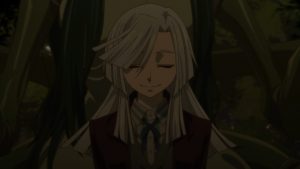 Looking back over the past several anime seasons, it’s hard to remember another series that’s been so thoroughly on-point as Mahoutsukai no Yome. In most cases, even when we know the source material, there are ups and downs in the process of adaptation – not to mention a sense of uncertainty about how good the final product would be. Honestly, Mahoutsukai has been as close to exactly as expected as realistically possible. It’s religiously faithful to the source, it’s drawn and directed with supreme competence and confidence, and it rarely if ever has a misstep. It’s almost boring how predictably solid this show is, but that praising with faint damnation if ever I’ve written it.
Looking back over the past several anime seasons, it’s hard to remember another series that’s been so thoroughly on-point as Mahoutsukai no Yome. In most cases, even when we know the source material, there are ups and downs in the process of adaptation – not to mention a sense of uncertainty about how good the final product would be. Honestly, Mahoutsukai has been as close to exactly as expected as realistically possible. It’s religiously faithful to the source, it’s drawn and directed with supreme competence and confidence, and it rarely if ever has a misstep. It’s almost boring how predictably solid this show is, but that praising with faint damnation if ever I’ve written it.
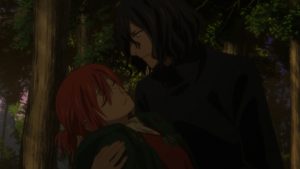 I don’t know if one has to have an interest in the mythology of northern Europe to truly appreciate The Ancient Magus’ Bride, but it certainly can’t hurt. This isn’t virgin territory for manga and anime, but it isn’t too often you see such a pure and well-researched take on it – often we see European fantasy melded with Japanese folklore (itself often a very interesting direction to take). What fascinates me in looking at Western myth through a Japanese perspective is how strongly it blends Christian and pre-Christian ideas in much the same way Shintoism and Buddhism have evolved in Japan. We tend to think of our belief system as a proper and orderly Judeo-Christian model and dismiss everything else as icky paganism, but much more of that ancient tradition survives than most of us are aware of.
I don’t know if one has to have an interest in the mythology of northern Europe to truly appreciate The Ancient Magus’ Bride, but it certainly can’t hurt. This isn’t virgin territory for manga and anime, but it isn’t too often you see such a pure and well-researched take on it – often we see European fantasy melded with Japanese folklore (itself often a very interesting direction to take). What fascinates me in looking at Western myth through a Japanese perspective is how strongly it blends Christian and pre-Christian ideas in much the same way Shintoism and Buddhism have evolved in Japan. We tend to think of our belief system as a proper and orderly Judeo-Christian model and dismiss everything else as icky paganism, but much more of that ancient tradition survives than most of us are aware of.
 That notion is very much alive in the person of Joseph, who emerges as the first true villain in Mahoutsukai no Yome. In fact Joseph’s real name seems to be Cartaphilus – though he despises being called by it. Cartaphilus is a legendary figure in Christian tradition – though truly folkloric in nature, as he’s mentioned nowhere in the bible. He was supposedly a man (depending on the story either a doorman at Pontius Pilate’s estate or a tradesman) who mocked Jesus on his way to the crucifixion, and was cursed to wander the Earth until the day of reckoning (he’s also a common instrument for anti-Semitic hate mongering, but that’s a topic for another day). Given the events of this episode, the connections with Joseph’s character should be obvious.
That notion is very much alive in the person of Joseph, who emerges as the first true villain in Mahoutsukai no Yome. In fact Joseph’s real name seems to be Cartaphilus – though he despises being called by it. Cartaphilus is a legendary figure in Christian tradition – though truly folkloric in nature, as he’s mentioned nowhere in the bible. He was supposedly a man (depending on the story either a doorman at Pontius Pilate’s estate or a tradesman) who mocked Jesus on his way to the crucifixion, and was cursed to wander the Earth until the day of reckoning (he’s also a common instrument for anti-Semitic hate mongering, but that’s a topic for another day). Given the events of this episode, the connections with Joseph’s character should be obvious.
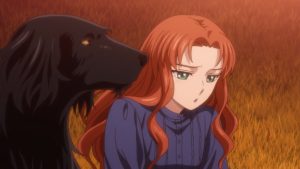 Joseph is clearly a rogue, even among the roguish fraternity of sorcerers – he thinks nothing of the “tacit agreement” that sorcerers and mages will stay out of each other’s way, and seems to act merely for the purposes of alleviating his own boredom and curiosity. Last week we saw him bring out Elias’ true form for the first time – now it’s Chise whose full force of ire is drawn out by the ageless sorcerer. For his cruelty in the Kingdom of Cats, and for his violation of Isabelle and what it’s done to Ulysse, Chise prepares to unleash her full power to smite him down. Last time it was Chise who brought Elias back from the dark place – this time around he’s the one to return the favor.
Joseph is clearly a rogue, even among the roguish fraternity of sorcerers – he thinks nothing of the “tacit agreement” that sorcerers and mages will stay out of each other’s way, and seems to act merely for the purposes of alleviating his own boredom and curiosity. Last week we saw him bring out Elias’ true form for the first time – now it’s Chise whose full force of ire is drawn out by the ageless sorcerer. For his cruelty in the Kingdom of Cats, and for his violation of Isabelle and what it’s done to Ulysse, Chise prepares to unleash her full power to smite him down. Last time it was Chise who brought Elias back from the dark place – this time around he’s the one to return the favor.
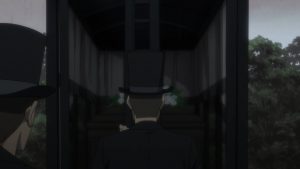 The truth of Ulysse’s story is a tragic one indeed – having waxed eloquent on the virtues of cats, Mahoutsukai now reflects on the timeless loyalty of dogs. Ulysse in his mind may have been Isabelle’s brother, but in truth he was never human. He became a church grim by remaining at her grave waiting for Isabelle to wake until he died himself (most dogs traditionally come by the role in far more grisly fashion). But no matter how long he waits for her, Isabelle will never wake – and the horror she’s become in Joseph’s hands is in no way the girl Ulysse loved and died for.
The truth of Ulysse’s story is a tragic one indeed – having waxed eloquent on the virtues of cats, Mahoutsukai now reflects on the timeless loyalty of dogs. Ulysse in his mind may have been Isabelle’s brother, but in truth he was never human. He became a church grim by remaining at her grave waiting for Isabelle to wake until he died himself (most dogs traditionally come by the role in far more grisly fashion). But no matter how long he waits for her, Isabelle will never wake – and the horror she’s become in Joseph’s hands is in no way the girl Ulysse loved and died for.
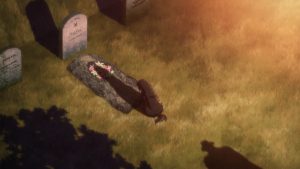 It’s Blue Flame (Ishida Akira) who intervenes and manages to bring things to a relatively peaceful conclusion. He’s a will-o’-the-wisp, perhaps the most famous of all the creatures of faerie. His actions give Ulysse the opportunity to ask Chise to make him her familiar, a pact which once made would be difficult for even Joseph to undo. As part of their bond Chise must choose a new name for Ulysse, and her choice might seem an odd one – we tend to think of “Ruth” as a woman’s name. But it’s also a word which means compassion and empathy (the opposite of “ruthless”), and this is surely why Chise chooses it – to honor the strength of character which bonded Ulysse to his his “sister” in life, and to symbolise that which unites him with his new master in death.
It’s Blue Flame (Ishida Akira) who intervenes and manages to bring things to a relatively peaceful conclusion. He’s a will-o’-the-wisp, perhaps the most famous of all the creatures of faerie. His actions give Ulysse the opportunity to ask Chise to make him her familiar, a pact which once made would be difficult for even Joseph to undo. As part of their bond Chise must choose a new name for Ulysse, and her choice might seem an odd one – we tend to think of “Ruth” as a woman’s name. But it’s also a word which means compassion and empathy (the opposite of “ruthless”), and this is surely why Chise chooses it – to honor the strength of character which bonded Ulysse to his his “sister” in life, and to symbolise that which unites him with his new master in death.
 All in all this two-episode arc is typical Mahoutsukai no Yome in every sense. The very soil in which this story plants its roots is loss – and even as it grows, the leaves and flowers it develops reflect the loss they’re grounded in. To live is to suffer, that seems to be the working truth of this series – a dark theme to build around, no question. But to find grace and dignity even when in pain and to celebrate the cycle of rebirth and creation that goes along with loss – there’s something quite beautiful in that, and it’s that which makes this series as emotionally powerful as it often is.
All in all this two-episode arc is typical Mahoutsukai no Yome in every sense. The very soil in which this story plants its roots is loss – and even as it grows, the leaves and flowers it develops reflect the loss they’re grounded in. To live is to suffer, that seems to be the working truth of this series – a dark theme to build around, no question. But to find grace and dignity even when in pain and to celebrate the cycle of rebirth and creation that goes along with loss – there’s something quite beautiful in that, and it’s that which makes this series as emotionally powerful as it often is.


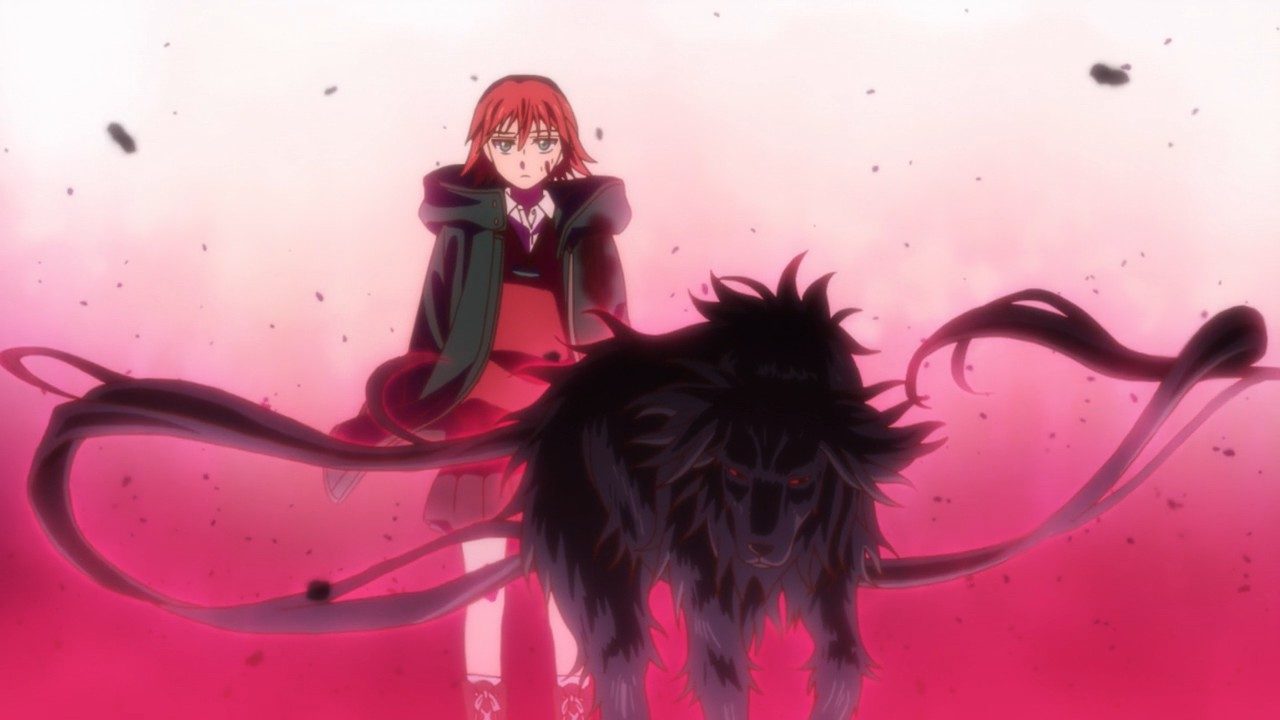

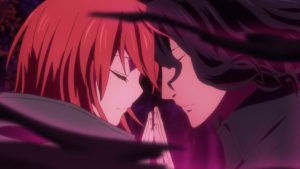
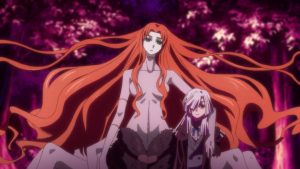
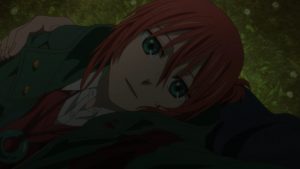
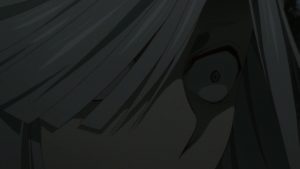
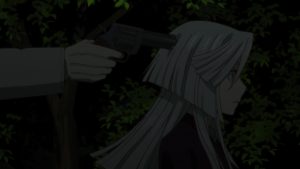
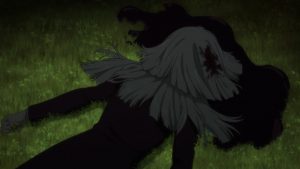
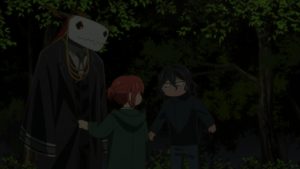
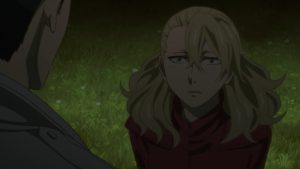
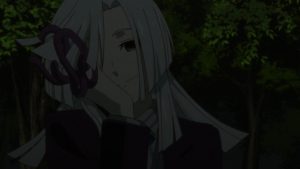
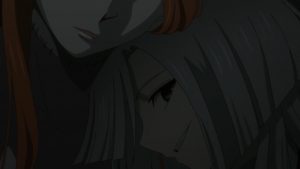
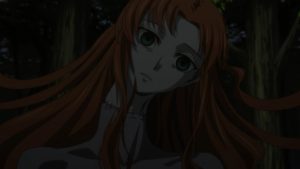
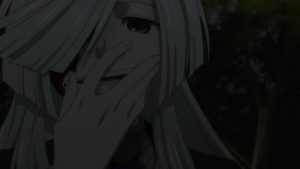
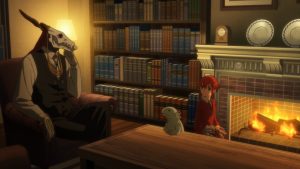
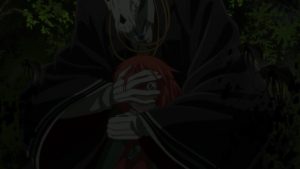
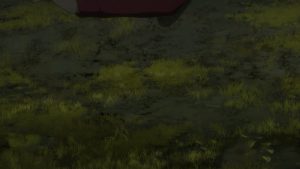
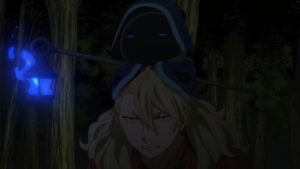
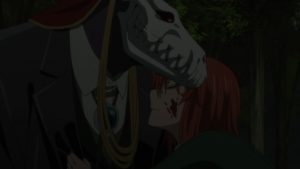
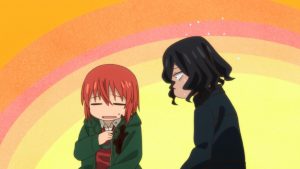
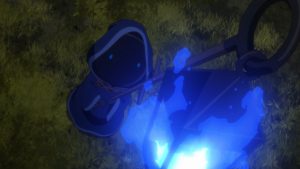
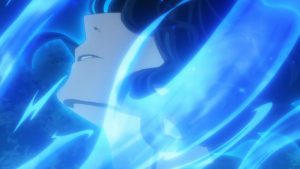
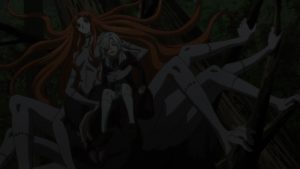
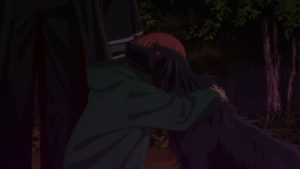
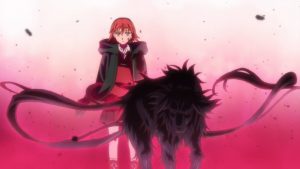
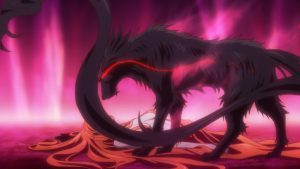
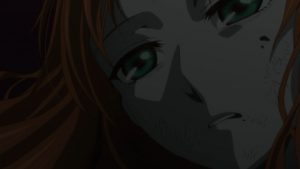
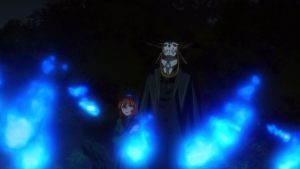
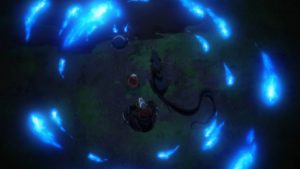
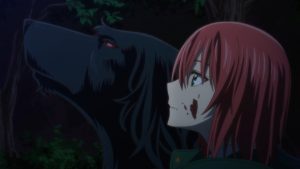
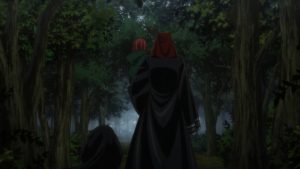
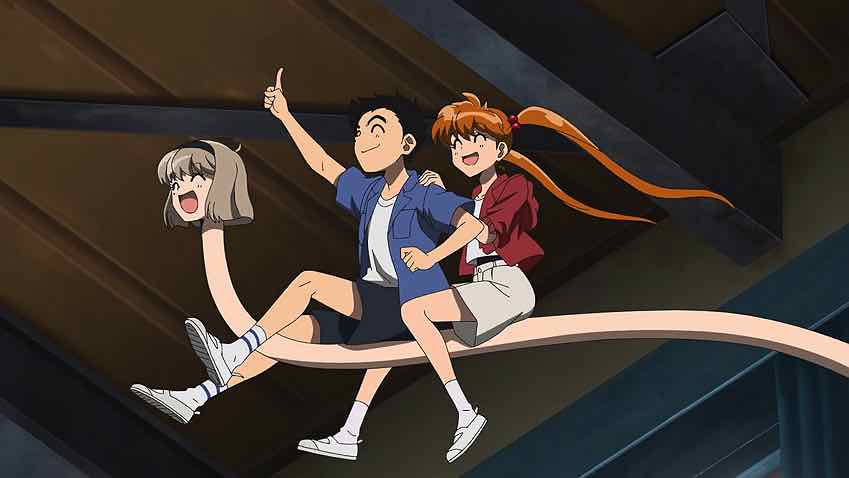
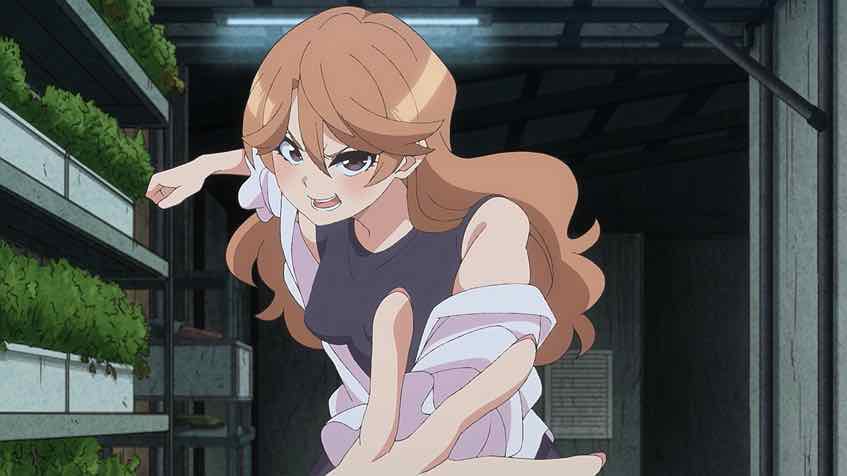
Shinrakugin
November 26, 2017 at 2:49 pmYou’ve mentioned Joseph’s origins, and the possible meaning of Ruth’s name as being related to “ruthless”. I certainly don’t doubt that this is possible (if not the reason). Joseph’s reaction for it, however, made me remember of another possible origin that’s equally interesting. Given his origins, he must have linked “Ruth” to the story of Ruth and Naomi. I admit I’m not very familiar with the story, and I’m not sure if it precedes Joseph’s or not, but I think it is a very good choice from the author, to name a dog and Chise’s familiar with a name coming from a history that’s, to me at least, mostly about loyalty.
Guardian Enzo
November 26, 2017 at 3:07 pmRuth and Naomi is old testament, so it pretty much pre-dates any word of Latin origin. But in fact (and I could be wrong about this) I always assumed the English word “ruth” derived from the biblical allusion.
elianthos
November 26, 2017 at 4:36 pmOn the Ruth-ruth connection (or rather lack thereof) an interesting thread here https://english.stackexchange.com/questions/36933/what-is-the-meaning-and-etymology-of-ruthless
TL;DR most likely not related. Ruth = companionship in Hebrew vs a constellation of Scandinavian-German-Anglo rue & friends.
Personally I like Yamazaki-sensei’s choice of Ulysse as a name too. Not only the titular hero’s tale is about returning(and finding) home/nostalgia/bonding (and vengeance on those threatening his loved ones) but Ulysse had a loyal dog waiting 20 years for his return to Ithaka – and who died finally at rest in his arms seconds after their reunion -.
as if Ulysses’ flashback story here pulling a semiHachiko by his human’s grave hadn’t me bawling in anime form already aaaaah.—-
In any case… “All in all this two-episode arc is typical Mahoutsukai no Yome in every sense. The very soil in which this story plants its roots is loss – and even as it grows, the leaves and flowers it develops reflect the loss they’re grounded in. To live is to suffer, that seems to be the working truth of this series – a dark theme to build around, no question. But to find grace and dignity even when in pain and to celebrate the cycle of rebirth and creation that goes along with loss – there’s something quite beautiful in that, and it’s that which makes this series as emotionally powerful as it often is.” THIS WAS INSPIRED. A quality Enzo moment what’s even left to comment after this :,)
Guardian Enzo
November 27, 2017 at 9:02 amYou’re too kind, believe me, but I appreciate the sentiment…
Simone
November 27, 2017 at 7:00 amOh, wait, so Cartaphilus would be the so-called “Wandering Jew” of the stories? I was trying to understand what that was all about, Joseph made me think of Joseph of Arimatea but that was supposed to be one of the good guys so. I never knew him with that name.
Guardian Enzo
November 27, 2017 at 9:04 amYes, that’s Cartaphilus – though that whole “wandering Jew” thing has been used so frequently over the millennia to justify anti-Semitism that it’s kind of a loaded name now.
Simone
November 27, 2017 at 1:51 pmWell, the whole of Christian mythos surrounding the whole “killing the son of God” thing has, really…
Guardian Enzo
November 27, 2017 at 2:04 pmYes, by the highest institutions of Christianity.